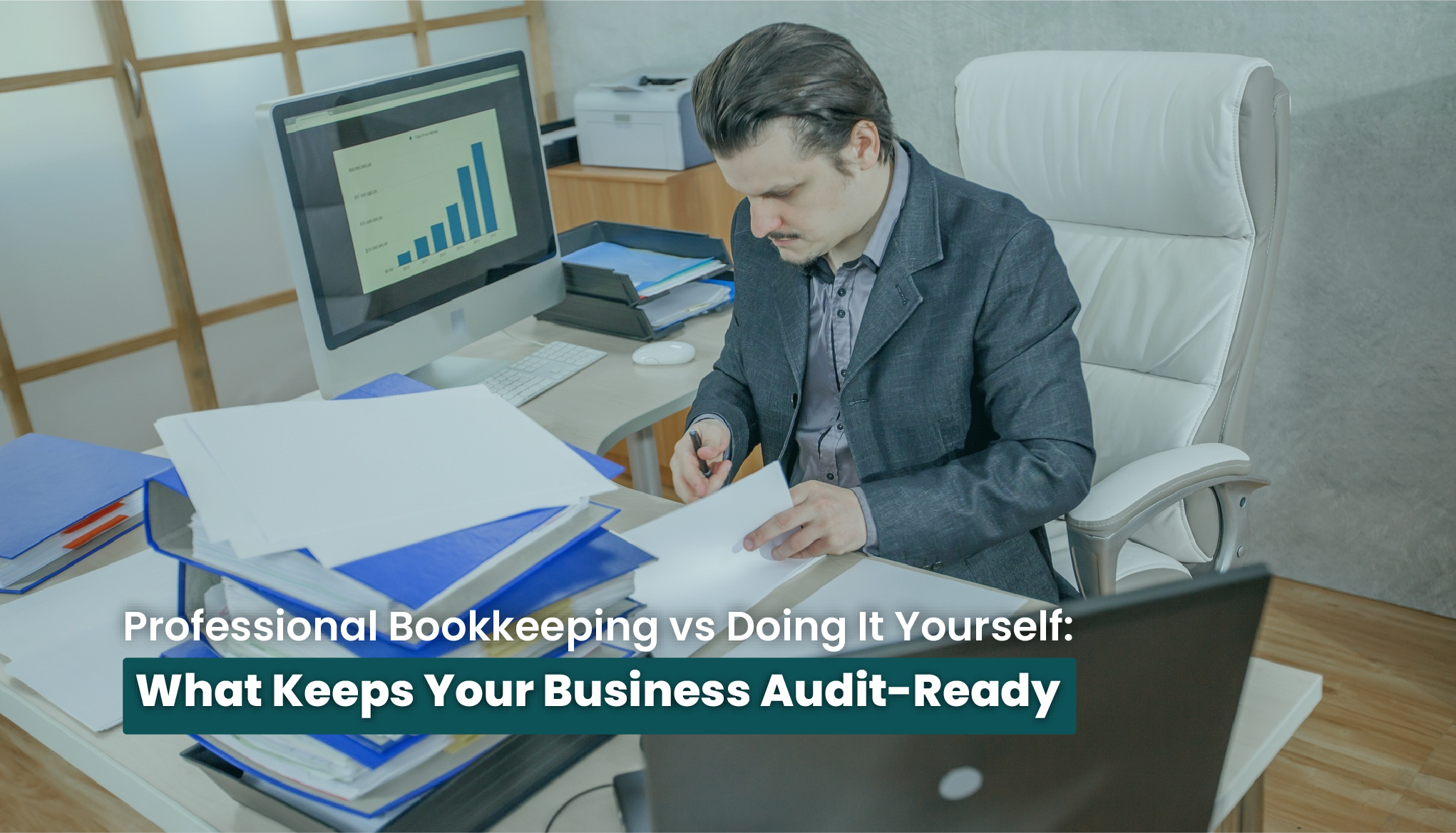In this article, we will look into the crucial differences between a professional and self-bookkeeping in an attempt to keep your business audit-ready. The right choice will also be able to help you be kept free mannered, avoid paying penalties, and put things in order in your financial house.
What is Bookkeeping and Why is it Important?
Bookkeeping is the process of recording and organizing all the financial transactions of a business. As such, it forms the part of bookkeeping and thus accounting too, meaning that if the books are not right, the financial reports and tax filings would also not be correct.
Whether that is your income or expenses, invoices and tax season prep: bookkeeping keeps all financial records on the mark. Especially in audit time when it matters all the more, every transaction has to be perfectly accounted for and verifiable.
Why Handling Your Own Books Might Risk Your Business?
Doing your books could seem cost-effective for small businesses or startups in the beginning. All you need is a line of green boxes across the page, or some accounting software, and wham, you’re in business, right?
Here’s what you’ll typically need to manage:
- Tracking all your sales and expenses
- Handling accounts receivable and accounts payable
- Doing bank reconciliation regularly
- Generating a cash flow statement
- Organizing receipts and documents
- Preparing tax-ready reports
You also need to understand double-entry bookkeeping, maintain a proper chart of accounts, and do regular checks to avoid errors.
Pros of DIY Bookkeeping:
- Saves money in the short term
- You stay closely involved in your finances
- Helpful for very small businesses with few transactions
Cons of DIY( Do It Yourself) Bookkeeping:
- Time-consuming
- Easy to make mistakes in data entry
- Lack of expertise in handling complex situations
- Not always audit-ready
- Risk of incorrect taxes and fines
What Is Professional Bookkeeping?
Professional bookkeeping means hiring a trained bookkeeper or a bookkeeping service to manage your day-to-day financial transactions. These experts know how to maintain clean, organized, and accurate financial records for your business.
A bookkeeper works with business owners to handle everything from financial reporting to preparing books for accountants at tax time. Whether it’s monthly reporting or end-of-year statements, a professional keeps your books audit-ready at all times.

Pros of Professional Bookkeeping:
- Saves you hours of work every week
- Reduces the risk of errors and missed transactions
- Ensures your books are always compliant with tax laws
- Keeps your financial information up-to-date
- Great support in case of an audit
- Clear and clean financial data for smart business decisions
Cons of Professional Bookkeeping:
- Involves a monthly or annual fee
- Less direct control (though you still have full access)
Key Differences: Self-Managed vs Professional Bookkeeping
| Feature | DIY Bookkeeping | Professional Bookkeeping |
| Time Investment | High (weekly work needed) | Low (outsourced work) |
| Accuracy | Depends on your skill | High accuracy |
| Audit Readiness | Risky and time-consuming | Always audit-ready |
| Tax Season Stress | High (especially if records are messy) | Low (everything is pre-prepared) |
| Cost | Low upfront, high if mistakes happen | Moderate cost, high long-term savings |
| Scalability | Difficult as business grows | Easily scalable |
Why Being Audit-Ready Matters
Let’s be honest—no one likes audits. But being audit-ready means you don’t have to panic if the taxman knocks on your door. You’ll have every receipt, transaction, and report ready to go.
With professional bookkeeping, your records are organized, updated, and properly categorized. The risk of missing entries or making wrong calculations is reduced. Plus, your bookkeeper can help respond to auditors with ease.
How Msafdar Can Help You Stay Audit-Ready?
At M Safdar, we understand how overwhelming bookkeeping can be for business owners. That’s why we offer tailored bookkeeping services designed specifically for small businesses in Pakistan and beyond.
Here’s how we support you:
- Maintain up-to-date books using modern tools
- Prepare clear accounting and bookkeeping reports
- Handle your bank reconciliation, tax documents, and reporting
- Provide a dedicated expert to manage your financial records
- Ensure all your bookkeepers record are accurate and compliant
Whether you run a shop, a trading company, or an online store, Msafdar helps you stay audit-ready without the stress. You focus on your business, we’ll handle the books.
Peace of Mind or Piece Together? Your Bookkeeping Decision
If you’re a startup with just a handful of transactions and a decent understanding of bookkeeping and accounting, DIY may work for a while. But as your business grows, so does the complexity.
In the long run, professional bookkeeping saves you time, reduces your risk, and helps your business grow stronger. It’s not just about being audit-ready—it’s about having peace of mind.
If we talk about a startup with a handful of transactions and basic knowledge about bookkeeping and accounting, DIY could work for some time. The higher the growth, the higher the complexity.
Professional Bookkeeping that Saves You Time, Minimizes Risk, and Powers
Long-Term Growth—All While Giving You Peace of Mind
FAQs
Q1: Is bookkeeping services for large companies only?
Definitely a no. The overwhelming majority of professional bookkeeping services benefit small firms, in fact, more so than larger organizations, who can thus save themselves from costly mistakes and stay within compliance.
Q2: What is the general price range for bookkeeping service?
Prices vary depending on the size of your business and the level of service you require. Here at Msafdar, we offer flexible pricing to accommodate different budgets.
Q3: Can I still use accounting software with a bookkeeper?
Yes, many bookkeepers use modern accounting software to manage your books. You can stay updated and view your finances anytime.
Q4: What does a bookkeeper actually do?
A bookkeeper works to record financial transactions, manage receipts, create reports, and keep everything audit-ready for accountants and tax season.
Q5: How do I know if my books are ready for an audit?
If your records are complete, organized, and match your bank statements and invoices, you’re likely in good shape. A professional can help you make sure.



